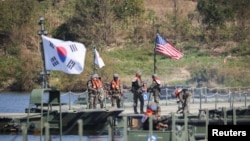Senior officials from the United States, Japan and South Korea will meet next week in Tokyo amid escalating threats from North Korea.
While the U.S. reaffirms its “ironclad” commitment to its allies, the State Department has declined to say whether Washington would consider the redeployment of tactical nuclear weapons to the Korean Peninsula, and whether the South Korea government has made such a request.
Deputy Secretary of State Wendy Sherman will participate in “a trilateral meeting with Japanese Vice Foreign Minister Mori Takeo and South Korean First Vice Foreign Minister Cho Hyundong” in Tokyo next week, according to the State Department.
Sherman’s talks will cover a range of regional security issues, including North Korea’s missile launches and Taiwan. U.S. Secretary of State Antony Blinken said Monday China is determined to bring Taiwan under its control, possibly by force, “on a much faster timeline.”
“Taiwan is a big part of” regional security that Sherman plans to discuss with allies in Tokyo, said a senior State Department official on Thursday during a phone briefing. “We expect cross (Taiwan) Strait differences to be resolved by peaceful means.”
And as North Korea speeds up missiles launches, the senior official told VOA that U.S. “commitments to the defense of the Republic of Korea and Japan remain ironclad.”
“We call on the DPRK to refrain from further provocations and engage in sustained and substantive dialogue,” said the senior official, referring to Democratic People's Republic of Korea, North Korea’s official name.
Tuesday, South Korea’s Joint Chiefs of Staff said North Korea fired about 100 shells off its west coast and another 150 shells off its east coast, a day after South Korea kicked off its annual Hoguk defense drills on Monday that are designed to boost its ability to respond to North Korea's nuclear and missile threats.
Earlier this month, Sherman and her counterparts from Japan and South Korea held talks to condemn North Korea’s October 4 firing of an intermediate-range ballistic missile over Japan that landed in the Pacific. It was the first such launch in five years, and prompted Japan to evacuate some residents in the area.
Senior officials have said the U.S. continues to be “open to dialogue without preconditions with the DPRK,” which they say is key to the ultimate goal of a completely denuclearized Korean Peninsula.
But North Korea’s leader Kim Jong-un has rejected Washington’s proposal for dialogue, saying he will never give up nuclear weapons.
President Joe Biden's administration also faces tough questions on the diplomatic impasse and inability to deter North Korea from further provocation.
The recently released White House national security strategy made little mention of North Korea’s threats.
“For questions on specific force posture. I'd refer you over to the Department of Defense,” said the senior State Department official on Thursday when asked to comment on calls to redeploy U.S. tactical nuclear weapons on the Korean Peninsula, as North Korea continues its missile launches at an unprecedented rate.
That official said the U.S. has affirmed its “extended deterrence commitment” to the Republic of Korea “using the full range of U.S. defense capabilities, including nuclear, conventional and missile defense capabilities.”
Opinion polls consistently show that most South Koreans support their country acquiring its own nuclear weapons, especially as North Korea continues developing its arsenal.
As a candidate, South Korea President Yoon Suk-yeol said he would ask the U.S. to agree to a nuclear weapons-sharing arrangement, or to redeploy tactical nuclear weapons that Washington withdrew from South Korea in the early 1990s — notions quickly rejected by the U.S. State Department. Yoon later walked back the comments.
In recent months, Yoon has reaffirmed South Korea’s commitment to the Non-Proliferation Treaty.
In September 2021, senior State Department official Mark Lambert made clear in an online forum that the U.S. policy “would not support” redeploying tactical nuclear weapons to South Korea, or a nuclear weapons-sharing arrangement with Seoul.




